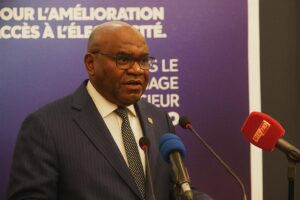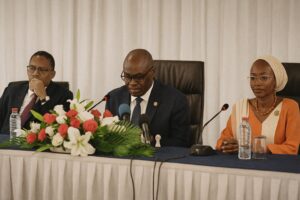Brazzaville’s Upstream Reset
The Republic of Congo has seldom shied away from bold gestures in the hydrocarbons arena, yet the decision to place every open acre of its sedimentary basin on the market at once still took observers by surprise. Announced on 28 October during a ministerial roadshow in Cape Town, the licensing round is designed to be governed entirely by a petroleum code that has not yet left the chamber of deputies. According to Director-General of Hydrocarbons Serge Ndeko, the 1994 legal framework has become ill-matched to the deep-water prospects now attracting seismic crews and to the mature onshore fields that demand enhanced recovery techniques. His diagnosis carries weight: the share of output coming from brownfield assets has begun to plateau, while frontier blocks lie ever deeper offshore, implying cost structures unimagined three decades ago.
Balancing Local Content and Global Capital
Officials speak with deliberate precision about the dual objective of the round: revitalising production and embedding local capacity. The forthcoming code is therefore expected to codify local-content thresholds for services, staffing and procurement in an explicit manner. Industry consultants familiar with early drafts point to a flexible sliding scale that rewards operators who exceed baseline targets by granting accelerated cost recovery. For Brazzaville, such provisions are meant less as a political slogan than as a hedge against the growing pains witnessed in regional peers where expatriate payrolls still dominate upstream operations. Government interlocutors make clear that national oil company SNPC will keep a carried interest, but not at levels that would discourage consortium formation.
Fiscal Modernisation under Parliamentary Scrutiny
While final tax rates remain under legislative review, preliminary language suggests a move toward royalty-and-tax systems calibrated to Brent volatility. Sliding-scale royalties would descend to single digits in ultra-deep tracts, whereas state profit-oil takes would increase in high-price scenarios. That architecture, inspired by models in Ghana and Guyana, attempts to reconcile budgetary stability for the Treasury with cash-flow certainty for international operators. Parliamentary sources in Brazzaville indicate that debate has focused less on the principle of reform than on the speed of its enactment; a vote before the end of the current session is widely anticipated. Market participants interpret the legislative choreography as a sign of policy coherence rather than delay.
Geopolitics of a Mid-Sized OPEC+ Producer
Congo’s membership in OPEC+ confers both leverage and obligation. Production targets, hovering near 300,000 barrels per day, have historically sat below nameplate capacity, granting room for incremental barrels once new acreage matures. Diplomats in Vienna argue that Congolese barrels carry political symbolism beyond their volume: they reaffirm sub-Saharan representation within the alliance. That said, Brazzaville has carefully avoided any rhetoric that might unsettle quota compliance. Officials underscore that new discoveries would be phased in through dialogue with the Joint Ministerial Monitoring Committee, preserving the country’s reputation as a constructive participant.
Pragmatism amid the Energy Transition
Mindful of external scrutiny on carbon intensity, the draft code is expected to incentivise gas monetisation projects and flaring reduction. Early consultations with multilateral lenders suggest that access to blended finance for associated-gas capture could hinge on transparent measurement, reporting and verification clauses embedded directly in production-sharing contracts. Private operators already present—most visibly Eni, Perenco and China’s Wing Wah—have signalled readiness to align with such requirements, viewing them as a hedge against reputational risk. The government, for its part, frames the measures not as concessions to external pressure but as avenues to strengthen energy security by expanding gas-fired power generation.
Investor Sentiment and Timelines
Data rooms, both physical in Pointe-Noire and virtual, are scheduled to open within weeks of parliamentary passage of the code, with bid submissions envisaged before mid-2024. Bankers canvassed during the Cape Town roadshow note a ‘cautious optimism’ among independents that missed earlier Congolese cycles dominated by the majors. The promise of stable fiscal terms is being weighed against logistical costs in ultra-deep environments and evolving ESG metrics. Yet the macro-drivers remain compelling: proximity to Atlantic refinery hubs, established export infrastructure and a diplomatic environment that prizes contractual sanctity. Analysts at regional think-tank CENOPEX foresee at least four competitive bids per block if the timetable holds.
A Calibrated Bet on the Future
Brazzaville’s latest licensing gamble is neither a wholesale liberalisation nor a retreat into resource nationalism. Instead, it represents a calibrated attempt to refresh governing instruments so that new geology, new technologies and new market expectations can coexist under predictable rules. By coupling local-content mandates with investor-friendly fiscal tweaks, the authorities are betting that global capital will accept higher developmental obligations in exchange for geological upside. The months ahead will test whether that balance resonates in boardrooms from Houston to Beijing. For Congo-Brazzaville, the payoff could be a more resilient hydrocarbon sector that sustains public revenues while gradually deepening domestic capabilities—an equation that, if it works, may offer a template for other mid-sized producers navigating the same crossroads.
















